5 Brands With Compostable Packaging
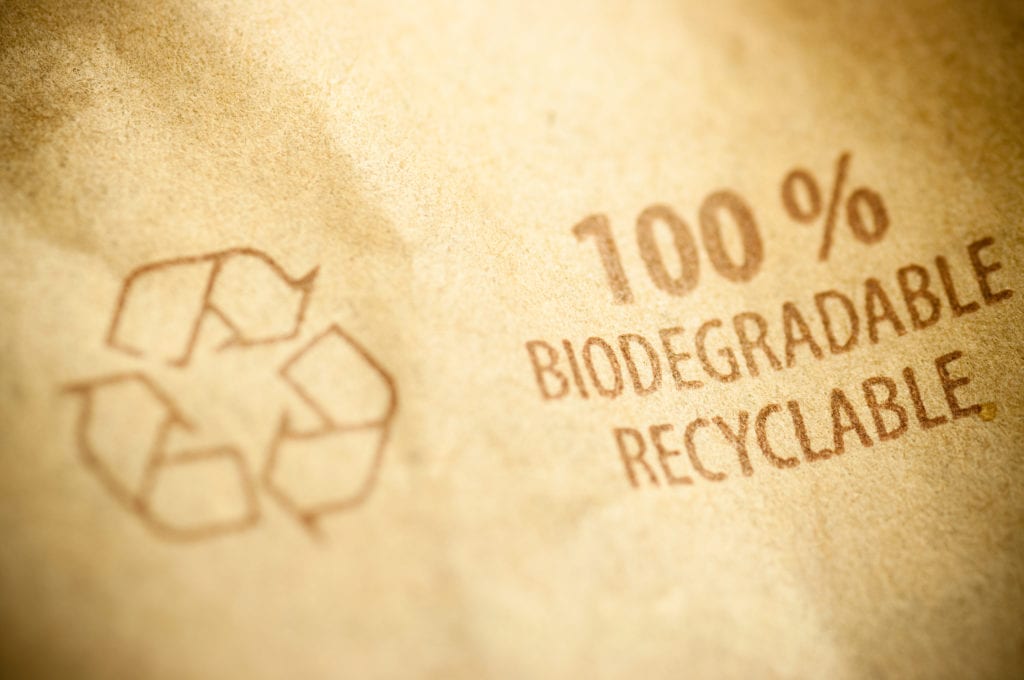
In a perfect world, all of your empty chip bags or juice bottles would be made with compostable packaging and would naturally break down. Unfortunately, we don’t live in a perfect world. Every consumer has to take steps to recycle and compost in order to reduce their environmental impact.
Fortunately, there are brands out there that are making it easier for customers to do just that. They wrap their products in compostable packaging that actually can be thrown in the worm bin to biodegrade.
These brands are taking a serious look at how their products impact the environment. These five companies, in particular, are leading the way to compostable packaging in each of their industries.
1. Alter Eco
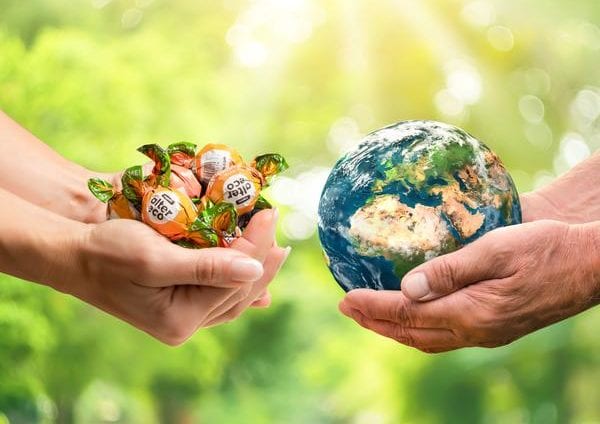
Alter Eco is paving the way towards sustainability in every aspect of their business. But they really stand out when it comes to compostable packaging.
About a decade ago, the company set out to find sustainable alternatives to their plastic wrappers. Previously, their chocolate truffles and chocolate bars were wrapped in non-recyclable plastic.
It took years of development and research, but Alter Ego was finally able to release its stand-up laminated pouch. The pouch is made from plant-based material and was 100% compostable. The company used it to package its quinoa products.
These days, Alter Eco partners with Natureflex to make compostable wrappers for their truffles. Natureflex makes these wrappers from eucalyptus and birch trees. They add microscopic aluminum layers to maintain freshness.
This material is compostable in industrial factories. It also biodegrades in the ocean, if the packaging happens to accidentally end up there.
Because the company uses only non-toxic ink in their packaging, they can be safely composted at home or in industrial facilities.
Alter Eco is also a Certified B Corporation. These are businesses that meet the highest standards of verified social and environmental performance. The certification also takes into account their public transparency and legal accountability to balance profit and purpose.
In addition to their compostable packaging, Alter Eco helps mitigate climate change through regenerative agriculture and carbon sequestration. They are a registered Public Benefit Corporation and listed as one of the “Best & Brightest” places to work in 2019.
Alter Eco sources its ingredients using Fair Trade principles. They also produce only organic and non-GMO foods with regenerative farming practices.
The company commits to in-setting carbon emissions. They do this by means of large-scale reforestation and conservation programs.
Most importantly, they dedicate themselves to creating minimal waste. Alter Eco is working towards 100% compostable packaging.
2. Don Maslow Coffee
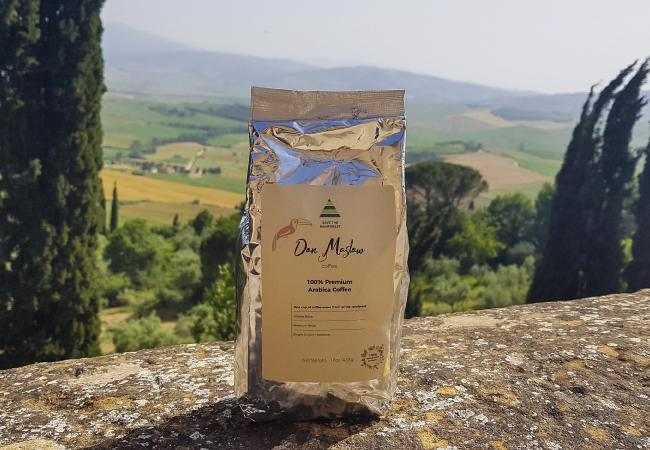
In the past, coffee companies have sold coffee in bags that claim to be compostable but are not actually certified for composting. They used non-compostable plastic parts to keep the packages airtight and the coffee fresh.
Don Maslow Coffee however has figured out the trick to having 100% compostable packaging that also keeps their beans fresh.
Specialty coffee companies require high-performing and protective packaging. This is because coffee is vulnerable to external influences. Propper packaging has to block oxygen, moisture, and UV rays to keep the coffee beans fresh.
Coffee packaging also needs to be airtight. This requires a degassing valve to let out excess carbon dioxide that is emitted after the beans have been roasted.
Don Maslow Coffee knew that there could be no compromise when it came to the quality and protective nature of their packaging. But one of their core goals as a company was to be as sustainable as possible. Thus, they began their long search for 100% compostable packaging.
The company found that most providers only offered a compromise. They had to choose between high-quality protective packaging and sustainability. Most of the packaging on the market was only 40% to 60% compostable.
While that was a step in the right direction, Don Maslow Coffee didn’t want to settle. To be truly compostable, every element of the packaging including films, valves, and zippers had to be compostable.
Finally, the company discovered Elevate Packaging. Elevate Packaging has been working hard for years to develop a coffee bag made with certified compostable films. Their bags have a high barrier layer for oxygen and moisture but are also strong and durable.
Now, Don Maslow Coffee partners with Elevate Packaging to ship their product out in 100% compostable bags. Yes, that even includes the zipper and valve.
Not only is this packaging sustainable, but it also keeps their coffee tasting its absolute best.
3. L/L Supply

Lifestyle Over Luxury or L/L Supply is an eco-clothing and accessories company. Their philosophy is that “the most sustainable product is one that already exists.”
A group of friends living in Australia started the company. The crew travelled around the world together. They sought outdoor adventures including surfing, skating, and climbing.
They found that their clothing was not made to survive their active lifestyles. As they burned through pieces that didn’t last more than a week on the road, they decided that they wanted something better. Better for people, the planet, and for the community they were building around this idea.
In 2018 they launched L/L Supply. Their company dedicates itself to using exclusively upcycled materials to create apparel. This includes factory floor cutting, end-of-roll fabrics, and even recycled water bottles.
Lifestyle Over Luxury is leading the clothing industry into a more circular business model. The idea is to create high-quality clothing from different recycling processes for people who appreciate quality and also want to minimize their environmental impact.
In addition to their upcycled clothes, L/L Supply supports a similar ethos for their packaging. The company ships its pieces in boxes that are 100% biodegradable and compostable. Even the packing tape that keeps the boxes shut is compostable.
L/L Supply is the clothing industry leader when it comes to sustainable packaging. Their clothing not only stands the test of time but also reduces the environmental impact of their consumers.
Partnered with their compostable packaging, this company is truly doing the work to increase environmentalism in the fashion industry.
4. Loving Earth
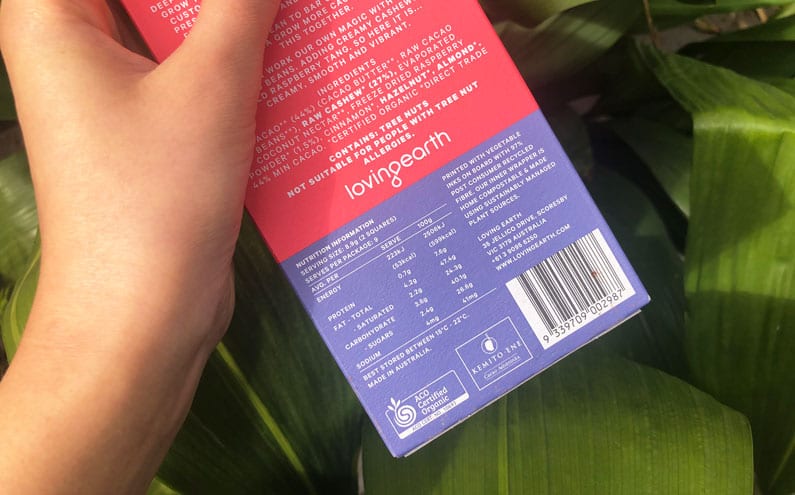
Loving Earth is another chocolate company that is doing its part to move towards zero waste packaging.
The company’s chocolate bar and superfood bar packaging are made with Econic. This is a compostable film derived from FSC certified wood pulp and cornstarch polymer from non-GMO corn.
Each of the cellulose and cornstarch components is FDA approved for food contact. The film itself is manufactured in a HACCP food safety-approved facility.
The decomposition of the packaging only happens when placed in a composting environment. It must contain heat, water, oxygen, soil, and microorganisms.
The boxes for Loving Earth’s larger chocolate bars are made from 100% post-consumer recycled wood fibres. They print the text on their boxes with vegetable-based inks. This ensures that no toxic chemicals are seeping into water supplies because of harmful dyes.
While the boxes themselves are non-compostable, the film that wraps the chocolate is. This film is made from Econic, so it is 100% plant-based, 100% compostable, and made from renewable sources.
Loving Earth also has a line of healthy cereals. The cereal boxes are also printed with vegetable-based inks and made of post-consumer recycled fibre. This makes them recyclable as well.
The inner bag that holds the cereal is also made from Econic. That makes it 100% compostable.
Loving Earth is also taking steps to ensure they are using sustainable packaging in all their products. The cans they use for products like Coconut Sugar and Maca Powder are made using recycled paper.
Consumers can upcycle the jars they package their Superfoods in for growing small plants and succulents.
Finally, the little white balls they use for packing are called “bio-fill.” They are made from corn starch and are compostable.
The bubble wrap that Loving Earth uses is made from 100% recycled plastic and can be recycled again after use.
5. No Evil Foods
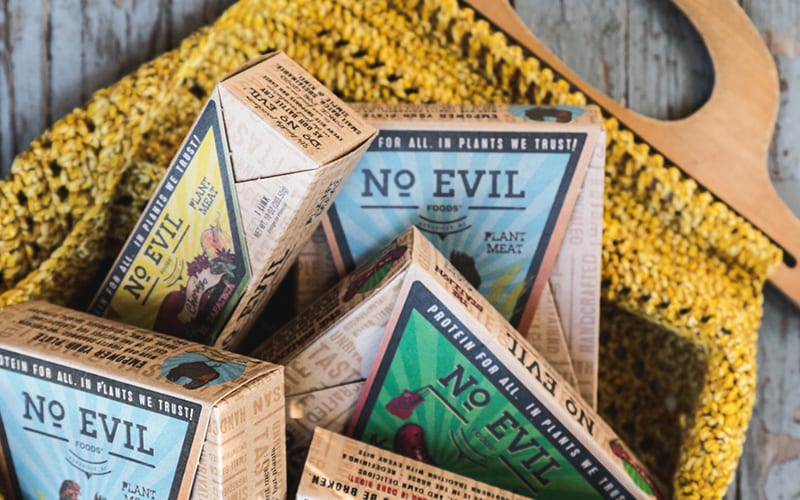
No Evil Foods is a company that specializes in vegetarian meat alternatives. They are actively fighting against the meat industry’s massive carbon footprint. They have also committed to sustainable packaging.
The company’s line of plant-based meat comes in compostable packaging made by Kraftpak. This is a biodegradable unbleached carton board that seals with water-soluble adhesives.
They print their packaging with plant-based ink. It is also certified for recycling, for those without compost bins.
No Evil Foods is also proud to be the first Certified Plastic Negative plant meat. For every pound of plastic in their packages, the company has teamed up with rePurpose Global to remove two pounds of plastic from natural ecosystems. This is plastic that would otherwise go to a landfill, get burned, or flushed into waterways and oceans.
This certification allows the company to directly partner with the Indian non-profit CarPe to employ and empower marginalized waste workers. These workers ethically reclaim and dispose of low-value plastic waste.
No Evil Foods has also been recognized for its commitment to reducing the company’s collective footprint. In 2017, they were awarded a NEXTY Award for Best New Packaging Innovation.
This company is paving the way for sustainability in the vegetarian meat industry. Their commitment to compostable packaging and cleaning plastic from the environment makes them a great choice for environmentalists and vegetarians alike.
Beware of Greenwashing
These five companies have truly put in the work to reduce their environmental footprint and give back to mother nature. But as a consumer, it’s important to be aware of companies that only look like they’re doing the work. This is a marketing strategy called greenwashing.
Greenwashing is a technique to make people believe that a company is doing more to protect the environment than it really is. Some forms of greenwashing include using nature-related imagery or the color green in their branding.
Other times, brands will try to emphasize how their product is promoting environmentalism with an irrelevant fact about it. One example of this trick is promoting an apple as being gluten-free or vegan. What actually matters is whether the apple was grown using sustainable farming practices.
Many companies recognize that the average consumer is now actively looking to lower their carbon footprint. The easiest way to do this is to consume products that are eco-friendly and support companies that commit to environmentalism.
However, companies that don’t want to actually put in the work to be eco-friendly or sustainable have learned to monetize this trend. They use vague brand messaging where possible, and sometimes even lie outright.
Beware of products that overstuff buzzwords and companies that don’t provide real evidence of their sustainability work. Look for companies like the ones listed above that have certifications to confirm that they are truly being eco-friendly
Recycle Right
Unfortunately, not every product gets packaged with compostable materials. But you can still do your part as a consumer to recycle any packaging components that you can.
This means being informed about exactly what materials can be recycled and how. It is extremely important to avoid wishcycling.
Also known as aspirational recycling, wishcycling happens when you toss something in the recycling bin without actually knowing whether or not it’s recyclable. This is actually bad for the environment because it can contaminate other recyclable items and make them unusable.
It’s important to take steps to avoid wishcycling. This includes learning local recycling rules as well as what can and cannot be recycled.
Anything with food on it, broken glass, broken light bulbs, and aerosol cans should never be recycled. Check your local rules before recycling glass bottles, plastic bags, and juice boxes. Some are recyclable, while others are not.
You should also ensure that all of your recyclables are clean and dry. Contamination is the number one reason that recyclable items end up in the dumpster.
Make sure that paper and cardboard products are dry. Give plastic bottles, aluminum cans, jars, and cups a good wash before you recycle them.
Working Towards 100% Compostable Packaging
Supporting brands that commit to compostable packaging is a great way to help the environment. Make sure to read up on how to compost effectively in order to maximize the work that these companies have put into sustainability.
In addition to supporting compostable packaging, make sure you take your recyclable containers to a bottle depot near you. This ensures that you are minimizing your ecological footprint in every way possible.
Related Posts
Your Trusted Partner for Recycling Solutions in Calgary
Assisting Small Businesses With Commercial Recycling Have you been looking for dependable recycling services in Calgary? We’re here to expedite…
Refundable Takeout Containers
Take The Trash Out of Your Take-Out In the last several months, Alberta has been packing a powerful punch in…
VIP Advantages at Sage Hill Bottle Depot
Get Your Cash Back Calgary! What’s up, Calgary? January is nearly over, you can take a breath and relax a…



